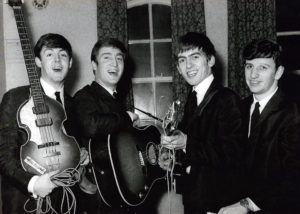A Decca record executive famously declined to sign the Beatles in 1962, saying “We don’t like their sound, and guitar music is on the way out.” A 1955 Variety Magazine article about the rock-and-roll craze predicted, “It’ll be gone by June.”
 Many now-famous predictions turned out to be spectacularly wrong. An 1876 internal memo at Western Union said, “This ‘telephone’ has too many shortcomings to be seriously considered as a means of communication.” Similarly, legendary movie producer Darryl Zanuck said in 1946 that “Television won’t last because people will soon get tired of staring at a plywood box every night.” IBM told the founders of Xerox that “The world potential market for copying machines is 5,000 at most” – which was almost as wrong as the banker who told Henry Ford, “The horse is here to stay but the automobile is only a novelty, a fad.”
Many now-famous predictions turned out to be spectacularly wrong. An 1876 internal memo at Western Union said, “This ‘telephone’ has too many shortcomings to be seriously considered as a means of communication.” Similarly, legendary movie producer Darryl Zanuck said in 1946 that “Television won’t last because people will soon get tired of staring at a plywood box every night.” IBM told the founders of Xerox that “The world potential market for copying machines is 5,000 at most” – which was almost as wrong as the banker who told Henry Ford, “The horse is here to stay but the automobile is only a novelty, a fad.”
Such predictions have sometimes come from world-class experts, as when Einstein wrote in 1932, “There is not the slightest indication that nuclear energy will ever be obtainable,” or when Microsoft CEO Steve Ballmer predicted that “There’s no chance that the iPhone is going to get any significant market share.”
Sometimes such forecasts even garner a consensus among many experts, as when thousands of technicians predicted the world’s computers simultaneously crashing on January 1, 2000 (Y2K). Or when thousands of scientists in the 1970s foresaw a dangerous global cooling – the “coming ice age,” they called it.
Such dire predictions about weather and climate disasters are nothing new, as highlighted in a new report by Steve Milloy (Energy and Environment Legal Institute), and Myron Ebell (Competitive Enterprise Institute). The report, called “Wrong Again: 50 Years of Failed Eco-pocalyptic Predictions,” includes numerous examples “apocalyptic predictions” with specific dates about climate disasters – not a single one of which have come true.
Their chronology begins with a prediction by Stanford Biologist Paul Ehrlich, a long-time darling of the environmental industry, of mass starvation and “dire famine” by 1975. In a 1967 speech, Ehrlich said time had already run out, and the world’s food supply would have to triple by the year 2000. “That may be possible theoretically,” he sneered, “but it is clear that it is totally impossible in practice.” Today, the world’s farmers produce more food than ever, while the ever-growing population is better fed than at any time in history. Ehrlich also predicted nationwide water rationing by 1974, and food rationing by 1980.
The predicted new ice age would be upon us in the first third of our current century, said the National Center for Atmospheric Research in 1970. Within a few years, that view was shared by thousands of climate scientists at universities around the world. Articles warning of the need to reduce our standard of living to prevent the ice age appeared in publications from Time Magazine and the Guardian to the New York Times and London Times. Throughout that decade, scientists warned of ozone depletion, acid rain, worldwide droughts, and endless summers, none of which happened as predicted. In fact, global temperatures increased, so that by 1989, some of the same experts started referring to “global warming” instead. Panels of scientists around the world said sea levels would rise by as much as 6 feet – the Associated Press writing that “Rising sea levels could obliterate nations,” and “New York’s West Side Highway underwater by 2019.” NASA scientist James Hansen testified in 2008 that the Arctic would be of free of sea ice within 5-10 years, and Prince Charles told audiences we had only eight years to save the planet. Al Gore said the polar ice cap would be gone by 2013. As Milloy and Ebell wrote, “Inconveniently, it’s still there.”
In the years since, “experts” have lowered their estimates of rising sea levels from feet to inches, and because the levels of warming they predicted did not happen, the terminology was amended to “climate change.” That covers everything, providing activists a powerful tool to advocate radical changes in our lifestyles.
The climate is changing, of course, constantly. We should continue studying its causes and effects. I am certainly no expert on it, but the point is – neither are the “experts.” In truth, there is a good deal of mystery about climate and weather, so people – even scientists – should stop claiming “the science is settled,” and that we “know” things we don’t actually know. Lest they embarrass themselves further, and go down in history next to that Decca Records executive or Henry Ford’s banker.
This column originally appeared in the Grand Junction Daily Sentinel October 11, 2019.




Comments on this entry are closed.